Counterclockwise: Nokia 3310 and and its family tree
In honor of the 3G-enabled Nokia 3310, we wanted to trace the history of one of the best-known phone models. What made it so popular and is it still relevant today?
Our story begins with the Nokia 3110, the first phone to feature the Navi-Key, a smart button below the screen whose function changes in each menu (the label on the screen tells you its current function). This became the primary way to navigate Nokia's feature phone interface, surviving well into the touchscreen era (when the physical button was replaced by the touchscreen itself).
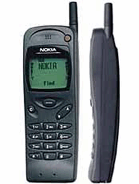
Nokia 3110
Two years later came out the Nokia 3210.
With 160 million units sold, it is to this day one of the most popular
phones ever. Having Snake pre-installed probably helped.
You can see the familiar design start to take shape as 3110's external antenna was chopped off. This was one of the first phones to do it, but reception suffered a bit.
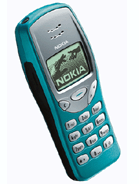
Nokia 3210
Finally, the Nokia 3310
came to be. Announced 17 years ago (on September 1, 2000), this became a
legend of a phone... and the subject of more than a bit of
exaggeration. Its sales total 126 million, not quite as popular as the
phone it replaced.
Anyway, the selection of games was updated, with Snake going up to version 2. The 3310 was also popular because it supported threaded view for SMS messages and texts could be as long as 459 characters (split between multiple messages).
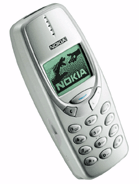
Nokia 3310
The following year, Nokia introduced the 3330,
a version with CSD. What's that, you ask? It's dial-up for cell phones
and it allowed the phone to connect to the Internet - or at least a
stripped down version known as WAP.
Moving on, the Nokia 3410 was the first phone by the company to support Java apps. It had two Navi-Keys for improved usability (the second key replaced the fixed-function back / delete key).
The 3410 also boasted 3D graphics, one of the first mobile phones to go beyond 2D. This despite its (from today's perspective) primitive monochrome screen with 96 x 65px resolution. 3D was used in animated screen savers and Munkiki's Castles (a game).
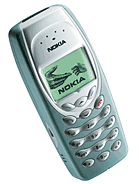
Nokia 3410
The Nokia 3510 and 3510i
were both introduced in 2002. The i model ran Nokia Series 30 with a 96
x 65px screen - but in color this time, a whopping 4,096 hues!
Nokia 3510 • Nokia 3510i
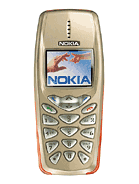
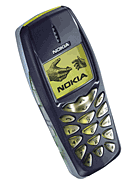 The Nokia 3100
followed in 2003. It ran the more advanced Series 40 software and could
take photos. But it's not quite that simple - the phone lacked a
built-in camera, instead one was plugged in via the Pop-Port.
The Nokia 3100
followed in 2003. It ran the more advanced Series 40 software and could
take photos. But it's not quite that simple - the phone lacked a
built-in camera, instead one was plugged in via the Pop-Port.
The Nokia Fun Camera PT-3 supported a few other Nokias and ran on 2 AAA batteries... yeah, really. The manual is a fun, nostalgic read.
You could capture photos in 640 x 480px resolution (VGA), framed through an optical viewfinder (no, you didn't get a preview on the 128 x 128px screen). The camera had a display, showing the battery and memory capacity (which was 8MB by the way, enough for 50 photos or so).
Well, that's all the pieces in place more or less. The 2017 version of the Nokia 3310 has larger, sharper screen and the camera is built-in (as is 64MB of storage, woah). The software has more polish overall, still featuring the Navi Keys. And just like that, Nokia feature phones still manage to excite people two decades after the 3110 launched.
Our story begins with the Nokia 3110, the first phone to feature the Navi-Key, a smart button below the screen whose function changes in each menu (the label on the screen tells you its current function). This became the primary way to navigate Nokia's feature phone interface, surviving well into the touchscreen era (when the physical button was replaced by the touchscreen itself).

Nokia 3110
You can see the familiar design start to take shape as 3110's external antenna was chopped off. This was one of the first phones to do it, but reception suffered a bit.

Nokia 3210
Anyway, the selection of games was updated, with Snake going up to version 2. The 3310 was also popular because it supported threaded view for SMS messages and texts could be as long as 459 characters (split between multiple messages).

Nokia 3310
Moving on, the Nokia 3410 was the first phone by the company to support Java apps. It had two Navi-Keys for improved usability (the second key replaced the fixed-function back / delete key).
The 3410 also boasted 3D graphics, one of the first mobile phones to go beyond 2D. This despite its (from today's perspective) primitive monochrome screen with 96 x 65px resolution. 3D was used in animated screen savers and Munkiki's Castles (a game).

Nokia 3410
Nokia 3510 • Nokia 3510i

 The Nokia 3100
followed in 2003. It ran the more advanced Series 40 software and could
take photos. But it's not quite that simple - the phone lacked a
built-in camera, instead one was plugged in via the Pop-Port.
The Nokia 3100
followed in 2003. It ran the more advanced Series 40 software and could
take photos. But it's not quite that simple - the phone lacked a
built-in camera, instead one was plugged in via the Pop-Port.The Nokia Fun Camera PT-3 supported a few other Nokias and ran on 2 AAA batteries... yeah, really. The manual is a fun, nostalgic read.
You could capture photos in 640 x 480px resolution (VGA), framed through an optical viewfinder (no, you didn't get a preview on the 128 x 128px screen). The camera had a display, showing the battery and memory capacity (which was 8MB by the way, enough for 50 photos or so).
Well, that's all the pieces in place more or less. The 2017 version of the Nokia 3310 has larger, sharper screen and the camera is built-in (as is 64MB of storage, woah). The software has more polish overall, still featuring the Navi Keys. And just like that, Nokia feature phones still manage to excite people two decades after the 3110 launched.
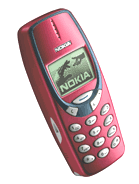
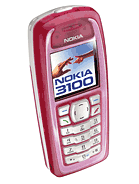
Comments
Post a Comment
Kindly Comment Only related to Post